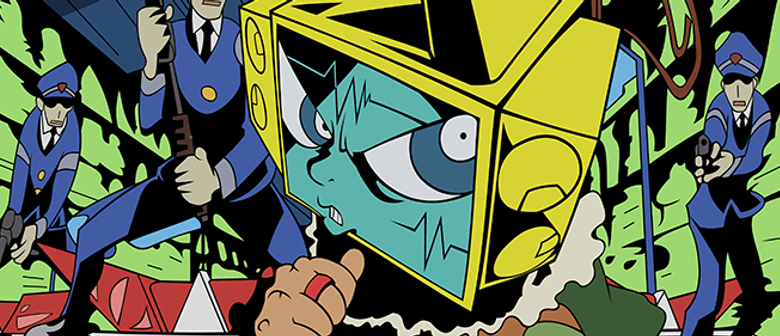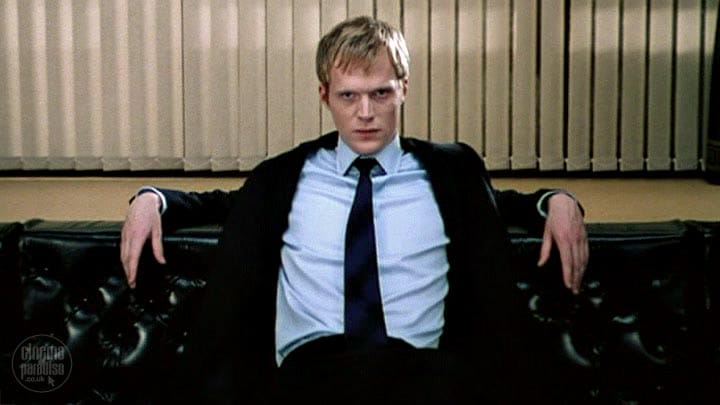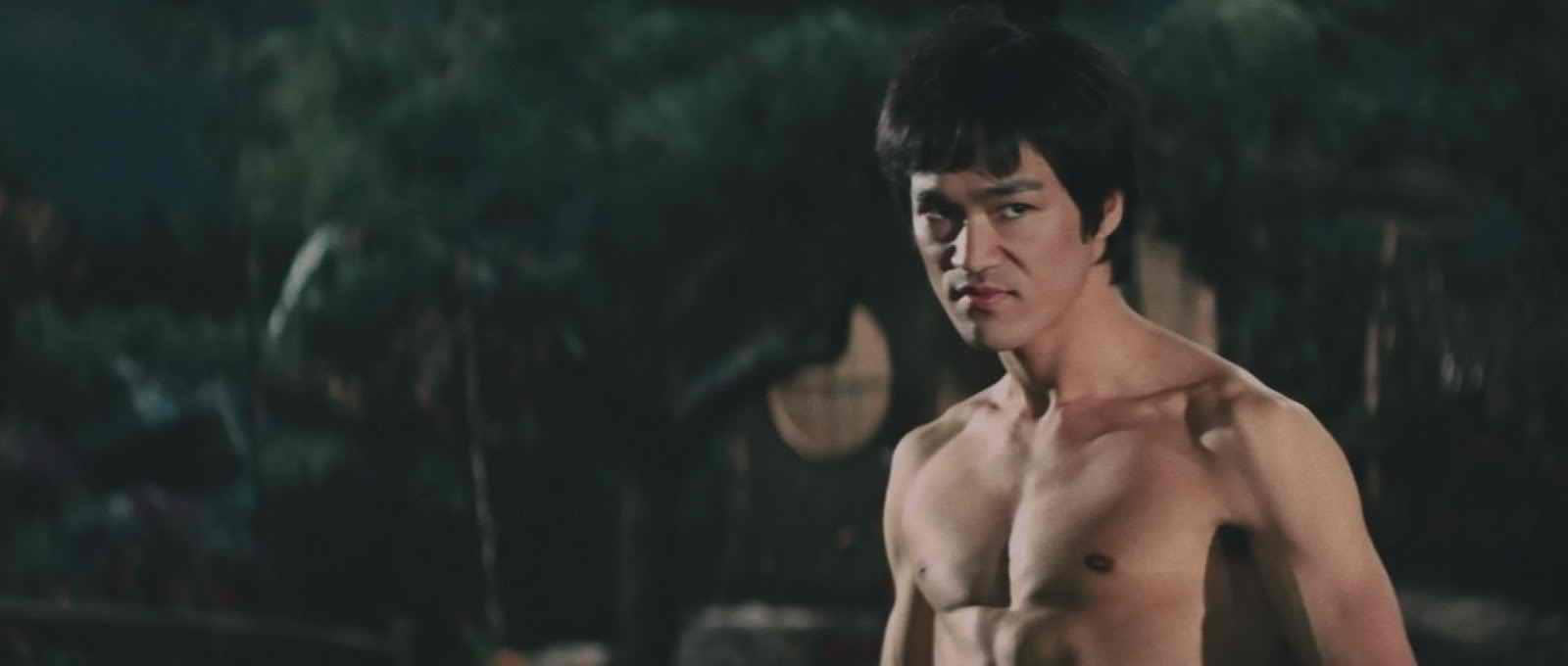#519 - Dead Leaves
Hiroyuki Imaishi, 2004

A pair of amnesiac criminals are arrested after committing a crime spree and sentenced to a maximum-security prison colony located in the remains of the moon.
It is clear from the outset that Dead Leaves is not remotely bound to the sort of slick, measured professionalism that frequently characterises animé at its best. From the outset, the roughness of character and prop designs becomes apparent when you can actually glimpse them amidst the extremely high-speed stream of cuts, comic-book frames, and visible sound effects cluttering the screen. This applies in terms of both style and substance, which quickly becomes clear when the film starts off by throwing the audience straight into a high-speed car chase featuring the leads trying to escape from the police. The story is also as thin as they come - after the chase ends, the two leads are captured and imprisoned in "Dead Leaves", a prison complex where inmates are restricted to being cocooned in full-body strait-jackets that only allow them to eat and excrete (both by force - don't ask). Eventually, the leads manage to orchestrate a prison break through methods that probably don't bear repeating for a number of reasons and before long they and the other inmates team up to riot against the insane warden and her super-powered lieutenants.
In addition to being an extremely quick and barely coherent action movie, Dead Leaves is also a blackly comic slice of science-fiction. Those expecting anything remotely tasteful are advised to look elsewhere; the fact that a supporting character's penis is actually a gigantic drill that's roughly the same size as the rest of his body should definitely be enough of a warning (and that's before you see it get used...) I can at least sort of respect the fact that the film goes all-out in making sure that every second of its relatively short running time (it clocks in at a mere 55 minutes) is throwing something shocking or thrilling at the screen. Despite the anarchic energy on display, it is very easy to get bored by Dead Leaves, perhaps more so than it is to get disgusted (and trust me, it is quite the disgusting movie). Even after taking into account the combination of the leads' amnesia and the rather unpleasant conditions of Dead Leaves, you barely feel any sympathy for the leads as they start fighting their way through the prison and start learning their true identities (thanks in no small part to the film stopping dead so that a doctor can deliver a massive dumping of exposition) and only remain sympathetic because the main trio of enemies are gratuitously sadistic monsters that are unquestionably worse (if not by much). The deliberately disorienting and weirdly creative visual style is a point in the film's favour that definitely makes it a somewhat memorable experience - however, the appeal is limited thanks to some of the more graphically offensive scenes on offer and how one eventually grows numb to the chaos unfolding on screen. If unadulterated high-speed cartoon hjinks sound like your thing, then go for it, otherwise I can't really see myself watching this more than once or seriously recommending it.
Hiroyuki Imaishi, 2004

A pair of amnesiac criminals are arrested after committing a crime spree and sentenced to a maximum-security prison colony located in the remains of the moon.
It is clear from the outset that Dead Leaves is not remotely bound to the sort of slick, measured professionalism that frequently characterises animé at its best. From the outset, the roughness of character and prop designs becomes apparent when you can actually glimpse them amidst the extremely high-speed stream of cuts, comic-book frames, and visible sound effects cluttering the screen. This applies in terms of both style and substance, which quickly becomes clear when the film starts off by throwing the audience straight into a high-speed car chase featuring the leads trying to escape from the police. The story is also as thin as they come - after the chase ends, the two leads are captured and imprisoned in "Dead Leaves", a prison complex where inmates are restricted to being cocooned in full-body strait-jackets that only allow them to eat and excrete (both by force - don't ask). Eventually, the leads manage to orchestrate a prison break through methods that probably don't bear repeating for a number of reasons and before long they and the other inmates team up to riot against the insane warden and her super-powered lieutenants.
In addition to being an extremely quick and barely coherent action movie, Dead Leaves is also a blackly comic slice of science-fiction. Those expecting anything remotely tasteful are advised to look elsewhere; the fact that a supporting character's penis is actually a gigantic drill that's roughly the same size as the rest of his body should definitely be enough of a warning (and that's before you see it get used...) I can at least sort of respect the fact that the film goes all-out in making sure that every second of its relatively short running time (it clocks in at a mere 55 minutes) is throwing something shocking or thrilling at the screen. Despite the anarchic energy on display, it is very easy to get bored by Dead Leaves, perhaps more so than it is to get disgusted (and trust me, it is quite the disgusting movie). Even after taking into account the combination of the leads' amnesia and the rather unpleasant conditions of Dead Leaves, you barely feel any sympathy for the leads as they start fighting their way through the prison and start learning their true identities (thanks in no small part to the film stopping dead so that a doctor can deliver a massive dumping of exposition) and only remain sympathetic because the main trio of enemies are gratuitously sadistic monsters that are unquestionably worse (if not by much). The deliberately disorienting and weirdly creative visual style is a point in the film's favour that definitely makes it a somewhat memorable experience - however, the appeal is limited thanks to some of the more graphically offensive scenes on offer and how one eventually grows numb to the chaos unfolding on screen. If unadulterated high-speed cartoon hjinks sound like your thing, then go for it, otherwise I can't really see myself watching this more than once or seriously recommending it.
__________________
Iro's Top 100 Movies v3.0
I really just want you all angry and confused the whole time.











